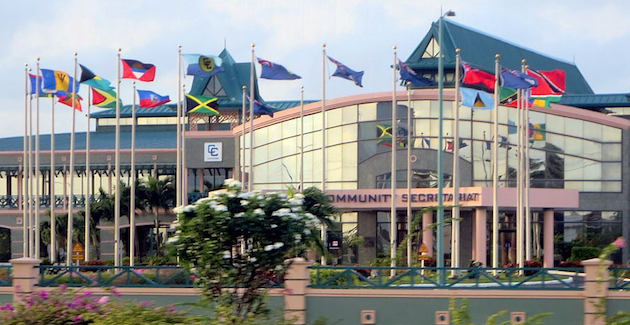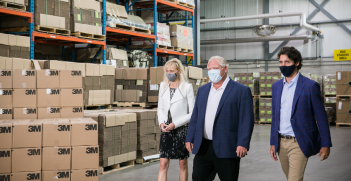Australia's Diplomatic Opportunity in the Caribbean

The traditional allies of Caribbean countries have reduced their involvement in the region, making it an opportune time for Australia to step in and create some valuable partnerships. But past experience shows that it must be more than temporary gift-giving and requires genuine engagement.
The Australian Department of Foreign Affairs and Trade (DFAT) will soon publish a foreign policy white paper outlining Australia’s priorities in international affairs. While the objectives and partnerships are being finalised, there is merit in considering opportunities to strengthen Australia’s relationships with the 15 member states of the Caribbean Community (CARICOM): Antigua and Barbuda, Bahamas, Barbados, Belize, Dominica, Grenada, Guyana, Haiti, Jamaica, St. Kitts and Nevis, St. Lucia, Saint Vincent and the Grenadines, Suriname, and Trinidad and Tobago.
The previous white paper, in 2003, signalled an engagement with CARICOM within multilateral forums, but there was no reference to interaction at a more substantive bilateral level. In practice, there were also minimal bilateral exchanges beyond Australia’s campaign for a non-permanent seat on the United Nations Security Council in 2012. This ad hoc approach to engagement was a missed opportunity for Australia to reaffirm its relationship with the region, and a group of countries that could be significant allies within the international arena.
Australia and the CARICOM member states have a longstanding diplomatic relationship, with prospects for even more sustainable and strategic partnerships on mutually beneficial issues. The impending release of DFAT’s white paper provides a timely forum for seizing these opportunities.
Common links
Commonwealth
CARICOM states represent 12 of the 13 Commonwealth countries in the western hemisphere. As a fellow member of the Commonwealth, Australia’s alliance with CARICOM would benefit from their shared language, colonial history, legal systems and political traditions. Within a global community with a multitude of cultures, backgrounds, religions and languages, there is comfort and leverage in these commonalities.
Small Island Developing States
The majority of CARICOM members are island nations, and CARICOM has advocated in multilateral forums for the sustainable development of small island developing states (SIDS), much like Australia’s closest neighbours in the Pacific. A synergy of priorities has been established within the United Nation’s sustainable development agenda, and should be further explored. One approach would be through increased bilateral collaboration, leveraging this coalition of support for advancing shared priorities in sustainable development and in the affairs of SIDS.
The Commonwealth and SIDS links represent the logical starting point for a partnership between Australia and the CARICOM states, and pave the way for greater collaboration through diplomatic, academic, cultural and economic channels.
Support for candidatures
For Australia, CARICOM represents 14 votes in global candidatures. Whenever possible, CARICOM members coordinate and vote as a bloc, to leverage their influence within the multilateral environment.
CARICOM’s endorsement and votes are valuable commodities in multilateral election processes, but particularly in the context of Australia’s current high-profile candidature to the UN Human Rights Council and its future UN Security Council campaign. However, Australia should be cautioned against taking a minimalist view towards engagement with CARICOM, particularly when Australia’s competitors are interacting more with the member countries.
During Australia’s previous UN Security Council bid, CARICOM members saw Australia’s increased interests in their region as a promising pivot towards a sustained alliance. Unfortunately, many perceived the engagement to revolve around the promise of financial and development assistance only.
It was a short-term vision from both sides that ultimately resulted in disappointment after Australia’s election victory, and a cautionary tale about allowing genuine alliances motivated by temporary aid projects, rather than driven by long-term strategic partnerships. Australia’s outreach to CARICOM countries should remain authentic and transparent, and should be nurtured with a long-term view.
Allies in international peace
The current international environment is tenuous. Reliable allies are needed in the fight against terrorism, cyber security, humanitarian crises, drug trafficking, money laundering, and other challenges to international peace and security. Australia and CARICOM countries have had like-minded views on how to tackle these issues for decades, but no significant alliances have yet been forged.
This limited attention to engaging the Caribbean is neither new, nor unique to Australia. There has been a slide in genuine engagement from traditional partners for a number of years, which has allowed other countries such as China and Venezuela to step into the void. This has resulted in traditional partners facing a diminished influence in securing CARICOM support on international affairs. The impending release of DFAT’s white paper is an opportune time for Australia to re-examine its engagement with CARICOM.
As Australia is aware, contributing to the closed-door work of the UN Security Council often relies on the goodwill and the support of allies in the UNSC. However, these alliances begin at the bilateral level.
Saint Vincent and the Grenadines is likely to win a seat on the security council in 2019, Guyana in 2023, and Trinidad and Tobago in 2026. If they are successful, Australia could have influential allies in the security council, in addition to its traditional ones, to address the many global security issues the UNSC will debate. These are the types of benefits Australia could derive from a foreign policy engagement strategy with CARICOM.
Shared goals, not gifts
Global partnerships should not be about aid, but rather about shared responsibilities, goals and ideas for working towards a common future. Adopting a limited engagement strategy does a disservice to both parties, limiting the long-term gains that could derive from greater interaction.
Australia is a global player and has the potential to be an influential one. However, this would entail more meaningful engagement with like-minded countries around the world. As the CARICOM countries reposition themselves to become even more active in global affairs, considerable benefits can be gained by both Australia and CARICOM through the strengthening of their relationship.
Carlisle Richardson is a former ambassador of St Kitts and Nevis to the United Nations and a former sustainable development officer of the United Nations.
This article is published under a Creative Commons licence and may be republished with attribution.





